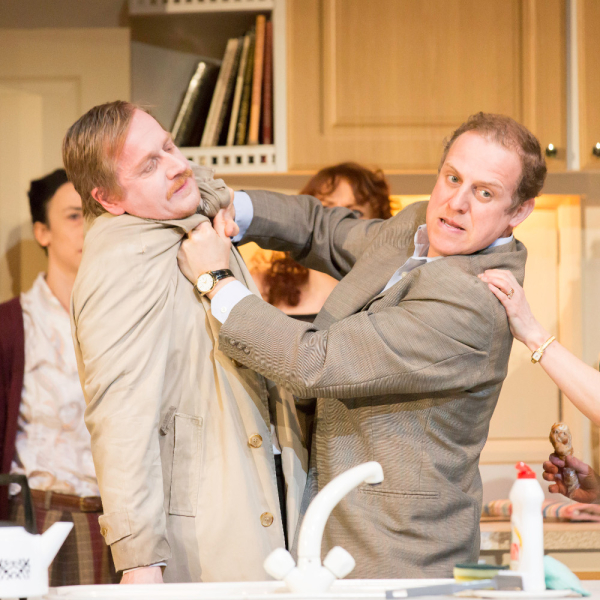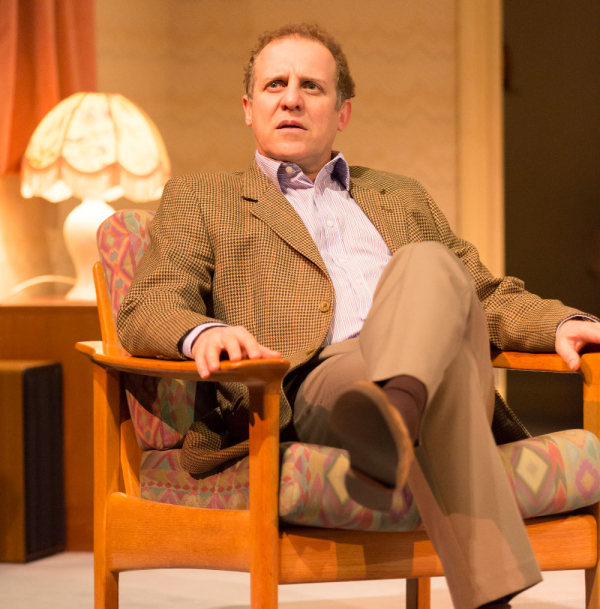A Small Family Business (NT Olivier)

© Johan Persson
Alan Ayckbourn‘s 1987 classic morality farce was written specifically for the Olivier stage, and Adam Penford‘s somewhat laborious revival restores the same split-level giant suburban doll’s house design (this time by Tim Hatley) to show the McCracken family in flux and on the fiddle.
At the height of the Thatcher era, Ayckbourn re-defined a nation of shopkeepers as a nation of shoplifters, with entrepreneurial values laid bare as an excuse for wholesale deceit and fraud. And in Jack McCracken, the great Michael Gambon role now played in much lighter, almost cheekier, vein by Nigel Lindsay, he created a management monster seduced into a maelstrom of financial debauchery, foreign market rackets and the drug culture.
Even if this production seems seriously underpowered, the actual mechanics are brilliant, as the whole messy saga unravels from the moment a sinister private detective, Benedict Hough (you can virtually smell Matthew Cottle‘s raincoat; the chap and his clothes are one big greasy smear) knocks on the door about a minor crime.
Jack’s daughter has stolen shampoo and eye-liner worth £1.87, which takes the edge off the opening party to welcome Jack as the new head of the family furniture business, Ayres and Graces. He’s moved across from frozen foods – fish fingers to furniture – and his wife Poppy’s furtive early evening preparations delude him into thinking he’s got lucky before bed-time; with blood pumping and trousers down as "Hairy Eric and his mighty meat axe" he jumps into the middle of a family gathering.
That was always the most hilarious opening, followed by Jack’s speech about basic trust and no more "take, take, take": effort and hard work, he says, is all there is. Instead, we see an unambiguous dramatic demonstration of the "everybody steals a bit" mentality that applies to cutting deals and claiming expenses down the ages.
Jack’s brother-in-law Desmond (Neal Barry) is selling off unlabelled furniture through the back door while his own brother Cliff (Stephen Beckett) is re-selling it on to an Italian firm called Rivetti whose five senior partners, all brothers, and all played by the same actor, Gerard Monaco, with various styles of face and head hair, are entertained upstairs by Cliff’s voracious wife Anita (Niky Wardley).
Some of the byways in the comedy don’t really land here: one daughter’s descent into drugs, for instance, or the fact that Desmond is a sadly incompetent cook who is salting away funds to open a restaurant in the Balearics. His defeated wife Harriet is played by Amy Marston with a fine blank acceptance but not the tragic wispiness of Marcia Warren in Ayckbourn’s own first production. Generally, there’s not enough colour, or killer detail, in the acting.
Debra Gillett gleams and glimmers supportively, though, as Jack’s wife Poppy, who’s done nothing much worse than filch paper clips at work. But all actions have their consequences as the horrible Hough becomes entangled in the family business himself, and efforts to buy him off lead to an unexpected dénouement in the bathroom, the ultimate cover-up.
In all, a decent revival, if not a shattering one, of a masterpiece that leaves you admiring the structure and carpentry of the play more than its fleshiness and character. Ayckbourn references not only Priestley’s main plot device in An Inspector Calls but also the lightness of touch of his hero, Ben Travers ("You’ve got all the reasoning power of a draft excluder" is sheer nutty Travers) and the moral indignation of Ben Jonson.












